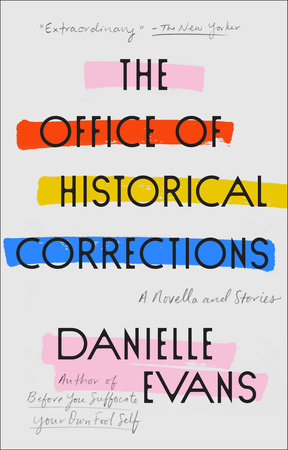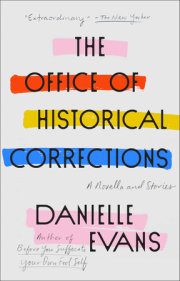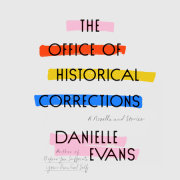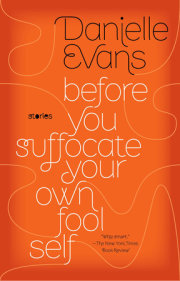Happily Ever After
When Lyssa was seven, her mother took her to see the movie where the mermaid wants legs, and when it ended Lyssa shook her head and squinted at the prince and said, Why would she leave her family for that? which for years contributed to the prevailing belief that she was sentimental or softhearted, when in fact she just knew a bad trade when she saw one. The whole ocean for one man. Not that she knew much about the ocean; Lyssa had been born in a landlocked state, and at thirty it seemed the closest she might get to the sea was her job working the gift shop in the lobby of the Titanic. It was not a metaphor: it was an actual replica of the Titanic, with a mini museum on the lower level, though most of their business came from weddings and children's birthday parties hosted on the upper decks.
The ship-shaped building was a creation of the late nineties, the pet project of an enterprising educational capitalist who wanted to build an attraction both rigorous in its attention to historical detail and visually stunning. To preserve history, he said to the public; to capitalize off of renewed interest in the disaster, he said to his investors. He had planned to build to scale, but that plan hadn't survived initial cost estimates. They'd only ever had a quarter of the passenger rooms the actual Titanic had, and most of those rooms were now unfurnished and used as storage closets, their custom bed frames sold secondhand during the last recession.
At the end of the summer season, a second-tier pop star rented the whole structure for a music video shoot, shutting down normal operations for three full days. Lyssa had been planning on having the time off, but when the video's director came to finalize the plans for the space, he'd stopped in front of the shop glass, stared for a minute, then walked in and said, "You-you're perfect."
She agreed to remain on-site for the filming and canceled the doctor's appointment she'd already rescheduled twice, giving herself in her head the lecture she imagined the doctor would have if he answered his own phone. Her coworker Mackenzie sulked around the ship for the rest of the afternoon, flinging herself into the director's line of vision without success. Mackenzie sometimes worked the gift shop counter with her, but only sometimes. Whenever there was a princess party, Mackenzie wore the costume dress and chaperoned as the princess-on-deck. Lyssa never worked parties; the one time anyone had bothered to give her an explanation for this (she hadn't asked), it was a supervisor who mumbled something about historical accuracy, meaning no Black princesses.
"We'd hate for the six-year-olds having tea parties on the Titanic to get the wrong idea about history," Lyssa said, so straight-faced that the supervisor failed to call her out for attitude.
"I guess they must want diversity," Mackenzie said after the director left, using air quotes for diversity even though it was the literal word she meant.
The next day, and, as Mackenzie went, genuinely conciliatory: "Maybe he wants to fuck you? He was cute, in a New York way. I bet he thinks you're exotic."
Exotic, not so much: the theme of the music video was sea monsters; everyone in it, including the pop star and Lyssa, would be painted with green body paint and spritzed with shimmer and filmed through a Vaseline lens that would add to the illusion that they were underwater. The pop star didn't want a ship; she wanted a shipwreck. Lyssa was just supposed to wear her regular uniform and work the counter and be herself in costume makeup.
Most of the real action took place on the upper decks. In two days of shooting, Lyssa only saw the pop star from a distance, through the glass, but a longtime backup dancer gossiped about her during a coffee break. The pop star dedicated this video to an ex who told a tabloid she'd let herself go and looked like a monster in recent photos. The video was about letting herself go, appearing on screen green and fat and nearly naked. The pop star was thinner than Lyssa had ever been in her life. Lyssa understood why she'd been picked and not Mackenzie; they needed someone in the store who could look like she knew what she was doing behind the counter. She was backdrop.
But the director did, apparently, also want to fuck her, though it seemed as much an afterthought as anything, the kind of whim that came to the kind of man who always wanted to fuck somebody. When they weren't filming, the pop star and her assistant and her dancers traveled together like a swarm of fireflies, and the director and the tech crew and the hair and makeup artists were left to less glamorously fend for themselves. After they'd shut down for the second day, Lyssa's last day of filming, the director appeared as she was locking up the store and asked if she wanted a drink.
"OK," she said.
"I haven't been here long enough to find a good bar, but I've got a great bottle of Scotch back at the hotel," he said.
Lyssa saw the opening. She had been here all her life. She could tell him where a good bar was. She did not. In the hotel bathroom she scrubbed off the stubborn lingering bits of the green makeup and tried to look as respectable as a woman about to fuck a stranger could. When she came out, he had poured them drinks and didn't seem to notice she was fully human colored again. She took a sip and put the drink down and he reached for her hand, turned her palm over, and began to trace something in it.
"Are you trying to tell my fortune?" she asked.
"I wasn't," he said. "But I have a lucky guess that you're about to make a man very happy."
It was so gross it was almost endearing.
The first time, they used the condom in the hotel's romance kit, which consisted of a single condom and a package of after-dinner mints in a tin adorned with a rose sticker. The second time he pulled out, and the third time he didn't.
"Was that OK? I mean I know I'm safe," he said, a sentence that in her experience, men who were in any capacity actually safe never had to say out loud. "But are you on something?"
"You don't have to worry about that," she said. "I don't have ovaries."
"Hmm?"
"My mom died of cancer. So they took mine out. To be safe. See the scar?"
She turned onto her back and pointed to the faint line across her abdomen.
"I'm sorry," he said, placing a palm on her stomach.
"It's fine," she said.
"You don't have to pretend it's OK" he said.
"We don't have to be friends," she said.
She did, in fact, have ovaries, but she also had a period you could set a watch by and an app that told her which weeks not to worry about carelessness. The scar on her belly was from an appendectomy sheÕd had as a teenager, and was the wrong direction for what it would have been if sheÕd had the other surgery. She was not supposed to still have the ovaries. A year and a half ago, her mother had gone to the hospital with what the intake doctor called textbook appendicitis symptoms and died of cancer eleven months later.
Because hospice was for people who intended to die, and Lyssa's mother didn't, she had refused to go. She died in the regular hospital, admitted through the ER, which meant even though she'd been remanded to the comfort care team, the doctor on rounds was officially required to come in once a day and report to Lyssa that her mother was still dying. He was kind about it, if not particularly attentive. Her mother was too drugged up to take the message herself, and the doctor was young and seemed embarrassed to be there, which was fair, Lyssa supposed-she too had stopped acting like this moment was anything but private. In the very beginning, when they'd still thought something could be done, Lyssa had gone to every new doctor's appointment dressed like it would be a photo shoot. She had bought clothes she couldn't afford, taken off early from work to press her hair, never met a new doctor without a full face of makeup.
There was always something they wouldn't tell everybody, and she wanted to be told, which meant she had to look like a real person to them, like a person whose mother deserved to live, like someone who loved somebody. Whatever information they weren't going to give her, whatever medicine they didn't bother trying on Black women, she would have to ask to get, would have to ask for directly so that it went in the file if they refused, but ask for without seeming stupid or aggressive or cold. She would have to be poised and polite through her frustration, which, thankfully, retail had prepared her for. Tell me what you would tell a white woman, her face said. A white woman with money, her clothes said. Please, her tone said. But eventually all the doctors told her the same thing, and Lyssa accepted there was nothing left to ask for. In the hospital at the end, she wore the same clothes for days and didn't bother combing her hair. A night janitor asked Lyssa if she was the patient's granddaughter; at first she was offended on her mother's behalf-illness hadn't aged her that much-but when she saw herself in the mirror, she realized it was not how old her mother looked, but how young she looked in her unmade state, how creaturely and unable to fend for herself. In the hospital bed, her mother looked alive and vital, only sleeping. They often go as soon as you do, a nurse said three days after they'd taken her mother off food, and Lyssa realized only much later that she had taken the wrong message, that the nurse hadn't meant Lyssa had to stay put or she might miss it. The same nurse pointed out on day five when her mother's urine bag had gone from yellow to brown, told her everything else would follow the kidneys and shut down soon.
Death would mean new logistics-administrators and insurance people. Lyssa showered in the hospital room bathroom, using the stinging antibacterial soap in the dispenser. She plugged in her blow-dryer and styled her hair. She put on a change of clothes , a muted-berry lipstick, and a sweep of mascara. When the doctor in charge of rounds came back, he looked at her as if seeing her for the first time. He asked her if anyone had talked to her about her own preventative options. No one had. He wrote on a prescription pad the name and number of the doctor he wanted her to call.
Lyssa thought she would talk to her mother about it, and then she remembered. She had to keep remembering, even after she'd seen the body and signed the paperwork and arranged a funeral. Somehow she'd expected the dying to be the worst part, that after it was over she could go home and tell some healthy living version of her mother about the terrible thing that had just happened to her. Lyssa felt cheated: out of a mother, out of a textbook diagnosis where they could have lifted the bad thing out of her mother and sent her home to recover. She was not ready to be cheated out of anything else. It took her months to call the doctor on the referral slip. She went to the appointment as her regular self, washed and neat, but otherwise unadorned.
"I don't have any children," she told the doctor.
"Were you planning on them?" he asked.
"I wasn't not planning on them."
The doctor sighed. He leaned forward and made a facial expression somewhere between a smile and a grimace, a face that looked like he'd practiced it in the mirror after being lectured about his bedside manner.
"Look, if you were going to try to have a baby tomorrow, I'd say perhaps that was your risk to take. But if you're not planning on starting a family anytime soon, well, you're not getting any younger, and I'd do this sooner rather than later. Take care of your real future, not your imaginary one."
Lyssa tried to imagine her real future. She had lived with her mother until her mother wasn't living. She had inherited the house, or whatever of the house she could get out from underneath the second mortgage, which locked her here for now if nothing else did. She could not imagine choosing the way her mother died, given a choice. But her mother had chosen it, had chosen, with her little bit of time left, every painful intervention, every last-chance effort, every surgical and injected and intravenous possibility of survival over comfort. When her mother asked and Lyssa said this is not what I would do if it were me, sometimes she meant you are brave, and sometimes she meant you are reckless and foolish, and sometimes she meant I can't imagine what would be worth trying this hard to live for. The first time she thought about dying, Lyssa was fourteen. She told her mother about the feeling and her mother said, "You'd have to shoot me first."
While her mother was dying, Lyssa was dating a bartender named Travis. She had been dating Travis before her mother got sick, though not for very long before. They met on Halloween, he liked to say, though it didnÕt really count as meeting in her mind-he had waved at her while she looked at him over the shoulder of a man in a pirate costume who was groping her and nibbling at her neck. Lyssa was trying to decide whether the pirateÕs gold tooth was part of the costume or part of his mouth when she looked up and saw Travis watching. Her costume had involved fishnets and a dress that wouldnÕt have made it out of her closet any other night, but she couldnÕt remember now what cheap last-minute addition had made it a costume-cat ears or vampire teeth or some kind of ominous hat. It was almost the end of slutty Halloween; last year, even the local college kids had been bundled into cartoon character onesies or dressed as clever puns, covered up like nuns, the real kind. But this was two Halloweens ago, and Lyssa hadnÕt known where things were headed, and wouldnÕt have known what else to wear even if she had. Mackenzie had insisted she come out, and then she and her friends had promptly disappeared into the barÕs drunken throng, leaving Lyssa to her own devices. When Travis saw her with the pirate draped around her neck, her dress half off her shoulder and whatever costume accessory sheÕd been wearing long gone, he raised an eyebrow, more a question than a judgment, and when he waved, it felt like Lyssa was snapped back into herself and had the answer. She extricated herself. The pirate pled with her as far as the bar door, but when he realized that following her out would mean heÕd have to wait in a line to get back in, he let her go.
Copyright © 2020 by Danielle Evans. All rights reserved. No part of this excerpt may be reproduced or reprinted without permission in writing from the publisher.







